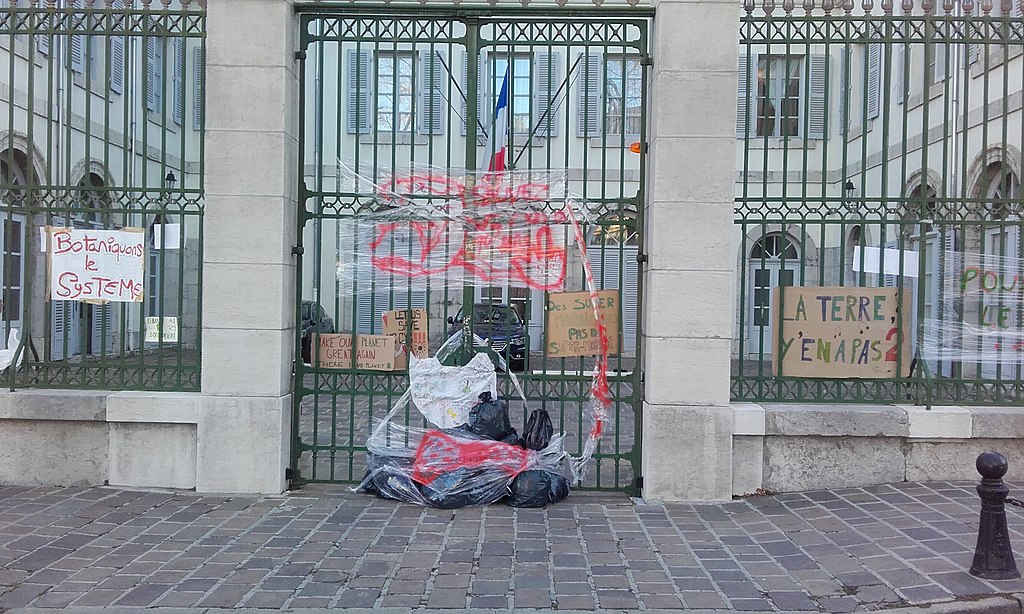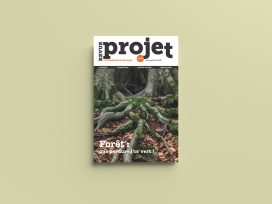
A combination of geopolitics and economic pressure is weakening the political will behind the European Green Deal, with the EPP leading the deregulatory offensive. Forests in particular risk becoming collateral victims of a rightwing U-turn.
The meritocratic premise of modern schooling serves merely to reproduce inequalities. In order to prepare young people for the challenges of the twenty-first century, the purpose of schooling must be fundamentally rethought. Green European Journal talks to political scientist Edouard Gaudot.
Green European Journal: Your book Dessine-moi un avenir (Actes Sud), co-authored with Rodrigo Arenas and Nathalie Laville, starts from the assertion that the original political project behind school education in France has had its day. Why?
Edouard Gaudot: Our analysis of France’s school crisis is that it’s not just about funding, staffing or training, but stems fundamentally from the obsolescence of its original project. The republican model of education that exists today in France was devised at the end of the nineteenth century, when the Third Republic and the construction of modern France were underway. The main aim of this republican school was, on the one hand, to consolidate the universalist mission of the Enlightenment, which it claimed to be furthering human and civil rights, emancipation through culture, knowledge, understanding and, of course, reason.
On the other hand, it also contained a vital political project: to embed the Republic in the nation and defend this Republic against its enemies within (the Church) and without (Germany). School education in France remains based on this model, despite demographic change, the democratisation of culture, European integration and globalisation, and the composition and maturity of French society.

Students clean up during the climate strike in Gap, France
Photo by Cocosea, CC BY-SA 4.0, via Wikimedia Commons
Education is increasingly recognised as a political cleavage. How are the polarisation of French society and the widespread disdain for elites, as highlighted by movements like the gilets jaunes, related to problems in the French education system?
There is a paradox that lies within the success of modern education. The great success is that we have reached a level of general knowledge that is unprecedented in human history – this doesn’t just apply to France but to all of the developed world. Today, even the least educated have a higher level of knowledge than they did in times past. This intellectual emancipation means that more people are thinking ‘by themselves’, even if, at times, it leads them to believe nonsense like the Earth is flat. When kids come out with conspiracy theories found online, they’ve taken the same approach as ‘scientists’: they’ve gone looking for knowledge, even if the source is contaminated.
One factor behind the crisis of trust in institutions is definitely school-related. As citizens, we no longer collectively take authority at its word. We doubt institutions and government. This is both a very good thing and something extremely problematic, because when you question authority, you must be able to replace it with either your own authority, or with alternative authorities. But alternative authorities could turn out to be a mullah online, a spiritual guru, or an online conspiracy. Here it gets interesting. School, in part, has fulfilled its mission by giving us tools to find knowledge but it hasn’t been able to prepare us for the next mission, which is to be autonomous in our authority.
The polarisation around education is also related to the cultural emancipation of elites from the rest of society. Demographic studies show that today, a third of society educated to university level exists in a sort of privileged bubble. If school no longer provides equitable dissemination of knowledge, it’s because part of society has, in a sense, seceded.
The gilets jaunes show – as do other movements – how part of the population feels despised and neglected by those who hold education, knowledge and power. And they aren’t wrong. They have enough education and knowledge to notice this difference and they regard it as an affront to their dignity. But they do not have the political and cultural means to close this gap.
This implies that the promise of education – the idea that everyone will receive an education which will equip them for success – has been broken.
Meritocracy is the promise. It’s like Catholic paradise: if you don’t rock the boat, you do what you’re told and you respect authority, then through your work and achievements, you will be able to better yourself. Yet experience, sociology and common sense teach us that this is false. This meritocratic promise, which was deceptive even in the 1960s when there was full employment and growth, has hit the wall of inequality today.
That’s what school is up against. School tells pupils to work to get a qualification or find a job, while the economic situation and immediate experience of many kids shows that this promise is false. They see their parents unemployed or in meaningless jobs for which they’re overqualified, they see discrimination, they know perfectly well that they don’t go to the Louvre like young middle-class Parisians. They know that, even if they do as well as they can, they’ll never catch up with those who had a head start.
So, school’s political project is obsolete and its promise of meritocracy is not being delivered. You start the book by quoting Greta Thunberg, who reminds us of perhaps an even greater promise, that of the future. Greta asks: why go to school if there’s no future? Your book says that education and school can provide a way out. How?
What we call ‘school’s identity crisis’ stems from the fact that, collectively, our society never asks the right question about school. When it comes to reform, everyone tries to adapt school to a new environment, while keeping the same structure and grammar. We argue that it’s not just a matter of adapting school, but rebuilding it to introduce the questions that the world asks us today.
We must ask the question that Greta asks: Why go to school if there’s no future? What are we going to learn at school? A trade? Socialisation? General knowledge? Today, with the universal library that is the internet, knowledge can be acquired anywhere, not just at school. School must above all prepare our children to face a world that is nothing like the one their parents knew.
There are three elements around which we believe it is necessary to rethink education. The first is the living world. Today, you can no longer study biology or geography without acknowledging the collapse of the living world and the upheaval of climate change. But you can’t deal with this by simply adding a chapter to natural sciences or geography and history textbooks; it’s more profound. It requires thinking our whole relationship with the living world. To take a concrete example, we’re convinced that school should also teach gardening: not to grow geraniums, but to understand the energy and science that connect seeds, soil, climate, patience and time, conditions for growth – and the ecosystem.
The second fundamental element is digital technology. We call this ‘the virtual’ in the book. Digital technology is a language and universe that is neither distinct from nor similar to the one we live in. Instead, there is a continuum between offline and online. The virtual is shaking up our relationships with other humans, the world, democracy, public space, and education.
Our fear is that all that school does is turn out lackeys for the ‘start-up nation’: a handful of people who succeed in getting ahead in this new economy, while many more are left behind and will find themselves working for Deliveroo, driving Ubers, or cleaning the offices for the new masters of the economy. If we are unable to anticipate the digital upheaval in the world of work, politics and human relationships, we will end up with even more polarisation, division and inequality.
The third element is interdependence, ‘connections’. Today, libertarians are the only ones who still say that you don’t need society and that you can go it alone. The myth of the self-made man, that’s all finished. We must replace this myth with another, that of connection; in other words, a description of our interdependence. And we must also learn about this interdependence at school, not just between countries, but between the virtual and the living world, between us and others – it’s a prerequisite for learning respect.
What are the implications for teaching methods? Understanding the virtual world isn’t just learning HTML. Learning about the living world isn’t just about learning gardening.
The change in teaching content necessarily entails a change in teaching methodology. When you learn about the living world, you no longer learn biology, geology, geography or chemistry. Instead, you learn about the links between all of these things and your relationship with the subject changes. The same goes for coding. Like Bernard Stiegler, who wrote the afterword to our book, we’re ardent advocates of teaching coding in school.
Then, there are obviously major things to change. The first is the way we recruit our teachers, because that will change teaching methods too. In France, teachers are recruited through a competitive examination system. Selection is based on erudition and academic study. There is often a gap between the level of subject mastery acquired by teachers and the level required in the classroom.
We must therefore change recruitment and pay teachers – who are very badly paid in France – better; we must organise their career so they aren’t prisoners of school and are instead teachers who have real life experience. Our teachers must be far more than just experts of the curriculum: they must be genuine guides – Heidegger talks about ‘shepherds of being’.
Where do new teaching methodologies fit into all this?
Although they are important for increasing awareness, new teaching methodologies like Montessori or Steiner are simply reactions to the rigidity of the system. So it isn’t just a competition between the traditional system and new teaching methodologies: we need to rethink our relationship with children.
In our western society, children are ‘little savages’. They’re either Rousseau’s ‘noble savages’ who must be left to be themselves, to live and to find themselves, as advocated by alternative teaching methodologies. Or children are savage creatures who must be tamed and civilised à la Emmanuel Kant, who hugely influenced the republican model of school education.
But children are neither noble nor ignoble savages: children are people. Only by changing our relationship with children and seeing them as people who have rights and who need to learn (and adults need to learn too) will change be possible. Ending the disconnect between childhood and adulthood, even with the prolonged period that is adolescence, means changing the organisation of school: the way that classes are organised, the way discipline is administered, even changing school buildings which, at times, resemble barracks.
What role would there be for children, parents, and all the people around school who aren’t necessarily teachers?
The educational community is a continuum. In remote societies, the village community shares responsibility for education – whether it’s hunters teaching how to hunt or cooks teaching how to cook. Our school is the product of our instinct for separation. We have a culture of disconnection: between private and public, secular and religious, nature and culture, children and adults, men and women, right and left. Education should work to bring them together.
That’s why we don’t want to ‘bring school into the twenty-first century’: we want to bring the 21st century into school. The twenty-first century means the environment, a different relationship with oneself, with society, with the world, with men and with women, and we want to bring all of this into school. We want school to change and become a privileged place, in other words, a place that’s protected to some degree, in which different influences can exert themselves. Obviously we can’t have parents turning up in the classroom; but neither can we have teaching staff or administrators dismissing parents by telling them ‘let us get on with it’.
The different parts of the educational community need to be connected so that education isn’t just a stage in life but continues throughout life. Everything that we’re saying about school and education policy amounts to a political revolution. This isn’t a book about education methodology, it’s a political book about school.
In The Fifth Sacred Thing, Starhawk describes a system in which school happens mainly out in the field, amidst nature, as well as in other significant places. We believe we need an education system that combines both knowing and doing, which doesn’t just teach theory and technique, but actually brings them together.

Photo by Archives du Jardin botanique de Montréal, CC BY-SA 4.0, via Wikimedia Commons
Regarding the political dimension, I’d like to draw a parallel with the United Kingdom. There, reforms that have given communities and parents greater opportunities to manage and even found schools have been associated with a sort of stealth privatisation. Does bringing communities into school, and thereby weakening school’s republican and universalist political project, run the risk of outside influences further reducing equality and opportunity?
Absolutely, but this is already the case. We’re already seeing the end of French republican universalism. The difference with Britain is that we’re not seeing this in terms of school autonomy, but rather decentralisation of education policy. Today, there is already very significant inequality between a school in the centre of Paris, Bordeaux or Lyon, and one on the outskirts of the city or in a rural area. The demographics are different, the socio-cultural environment is different, and so are the material conditions. Parents will sometimes try to circumvent the catchment area. And if they don’t succeed, they’ll seek excellence and meritocracy in the private sector, which today is often the answer to the failure of the republican promise.
The private sector means two things: private schooling or the tutoring market. The pandemic and the lockdown have laid bare and exacerbated the differences in cultural capital and technological wherewithal between families. We’ve seen an explosion in private tutoring in recent years because parents feel overwhelmed. They want the best for their children, but they can’t keep up with their children’s studies. They’ve also got their job to do and home to run. It’s privatisation as Chomsky describes: when public service are defunded and no longer work, people turn to private services.
By acknowledging these trends, your book has started a political debate around the meaning of education. Why has this debate has been absent until now?
School is a long-term project that can’t adapt to short-term political posturing. An education policy today shouldn’t be for the next five years, but for the next twenty years. Yet most reforms are tweaks, even when they are framed as ambitious reforms. That’s why we insist on having a political debate about school – not about ‘how to save school’ but about how to make sure that school prepares our children for what the world will be like in twenty years’ time.
There are few political movements today that have a real educational project. Reactionaries have one. They advocate for the return to tradition: teachers with authority, discipline and uniform. But their dream for the militarisation of school is an anti-educational project.
In our opinion, the only political family that still has an educational project are ecologists. But they have a tendency to neglect it, mainly for reasons to do with the history of political ecology. They built their educational project in the 1960s, ’70s and ’80s on the rejection of authority, on alternative teaching methodologies, on liberating children, and some of it is outdated. In some cases, they went too far, on sexual liberation, for example. Ecologists have yet to rethink their educational project.
While they were once very insightful on school, Greens have increasingly become experts on the fight against climate change, energy transition, or participative democracy. But they’ve barely developed their technocratic vision for school. When they get into power, they often have very little involvement with education. They know and say that education is vital for the future. But there’s a disconnect between the green project and the way in which it is expressed in the institutional sphere.
Can school be a way for the Greens to achieve their political project in the twenty-first century?
We’re convinced that it can be. That’s why the working title for our book was ‘L’école-logis’ . Ecology is the future. And it’s the future of education too. Greens must redouble their focus on school, and not just teach children to recycle their rubbish. They must make school one of their pillars, their foundations, their core values – and a battering ram for bringing society into the twenty-first century.
The decarbonisation of the economy will happen with or without the Greens. The challenge isn’t the economy or the energy transition. It’s our relationship with ourselves, with others and with the planet. Ecology has a plan for that and it’s up to Greens to develop it. And it starts at school.
Published 8 April 2021
Original in English
First published by Green European Journal
© Edouard Gaudot / Green European Journal / Eurozine
PDF/PRINTSubscribe to know what’s worth thinking about.

A combination of geopolitics and economic pressure is weakening the political will behind the European Green Deal, with the EPP leading the deregulatory offensive. Forests in particular risk becoming collateral victims of a rightwing U-turn.

Why forest restoration projects are counterproductive; how citizens are mobilizing to protect Europe’s woodland from the right; and why diversity is the solution to sustainable timber.